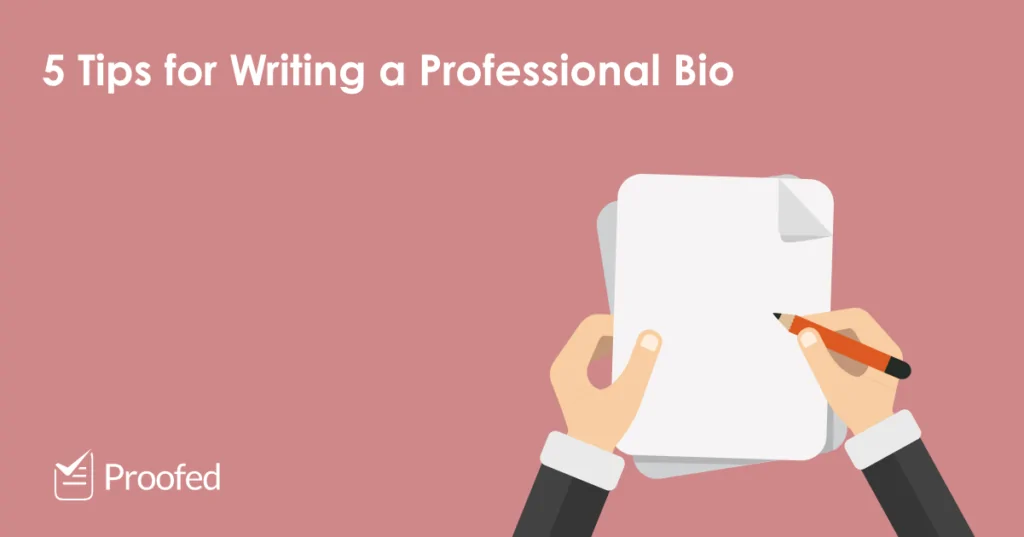A professional bio explains who you are and what you do. But the style and content of your bio will depend on various factors. If you need to create a professional bio of your own, though, following, these five tips will help:
- Think about the type and length of bio you need.
- Tailor your bio to your industry, your audience, and your goals.
- Decide whether to write in the first or third person.
- Write concisely and only include necessary information.
- Get your professional bio proofread to make sure it is error free.
For more on all the above, read on below.
1. Decide What Type of Bio You Need
First, decide what kind of bio you need to write. This will depend on what you’re writing it for, but it will also affect what you will include:
- A short bio summarises who you are in just a line or two, making it ideal for a social media profile. Typically, this will be limited to key details such as your name, job title/role, and possibly contact information.
- A mid-length bio could be anywhere from a few lines to a couple of paragraphs long. This length is perfect for LinkedIn, a staff profile for a website, or a blurb in a book or events program. As well as the basic information above, this might include details of your achievements, qualifications, skills, or even your personal interests.
- A long bio, which you might use for the ‘About’ section of a personal website, could be up to several paragraphs long. This gives you scope to include more information or to go into more detail about a few things.
Think about what kind of bio you need before you start writing.
2. Tailor Your Bio to the Situation
If you’re writing a professional bio for your employer’s website, you can usually use existing bios to gauge the tone and content required. Alternatively, your company might have a style guide to follow.
But if you don’t have an example to follow, such as when writing a bio for your own website, there are three key things you should consider:
- Your industry – The industry you work in may affect the tone of your bio. A corporate bio, for instance, may be formal and professional, with a focus on achievements and values. But a bio in the creative industries may be less formal and more personal. When writing your bio, then, think about the kind of voice that would best fit your role.
- Your audience – Who you are writing for may affect how you write your bio, especially in terms of vocabulary. If writing for the public, you would need to describe your role in everyday terms. But if your bio is aimed at fellow professionals, you have more scope for using technical language.
- Your goals – What you include in your bio may depend on your goals. Are you looking to impress employers? Inform potential clients of your skills and qualifications? Add a personal touch to a website? Think about why you’re writing a bio and plan the content accordingly.
If in doubt, look at bios from other people in your industry online to get a sense of how they’re written, then adapt this to fit your situation.
3. First or Third Person?
Generally, professional bios are written in the third person. So, even if you write your own bio, you would write as if someone else were describing you:
Joe Bloggs is a qualified proofreader and editor who has helped prepare dozens of bestsellers for the world’s leading publishers.
However, you can use the first person for a more personal tone:
Find this useful?
Subscribe to our newsletter and get writing tips from our editors straight to your inbox.
In my career as a qualified proofreader and editor, I have helped prepare dozens of bestsellers for the world’s leading publishers.
This is a bit less formal, but it works well for a personal blog or website.
4. Be Concise
Keep your bio succinct so that it’s easy to read and impactful. Even for a longer bio, you will want each paragraph to be concise and to the point.
The vital thing here, especially in shorter bios, is to limit yourself to essential information. Think about what you want your reader to know, then build your bio around these details, giving the most important information first (e.g. you should cover your achievements before your hobbies).
In terms of general concision, key tips include:
- Plan what to include so you can avoid repetition or waffle.
- Use the active voice rather than the passive voice where possible.
- Cut down on unnecessary adverbs, adjectives, and other modifiers.
This will help to ensure your bio reads smoothly and professionally.
5. Get Your Professional Bio Proofread
Your bio might be the first thing someone learns about you, so you’ll want it to be perfect to make a good first impression. Thus, once you’ve written a first draft of your professional bio, have someone else check it. A fresh pair of eyes will make it easier to spot errors or issues with clarity.
You could ask a friend or colleague to do this. But a better option is to ask a professional proofreader, especially for longer bios.
Our proofreaders, for example, will be able to offer feedback on style, content, and structure as well as correcting typos. Why not submit a trial document today and find out what our services involve for free?



